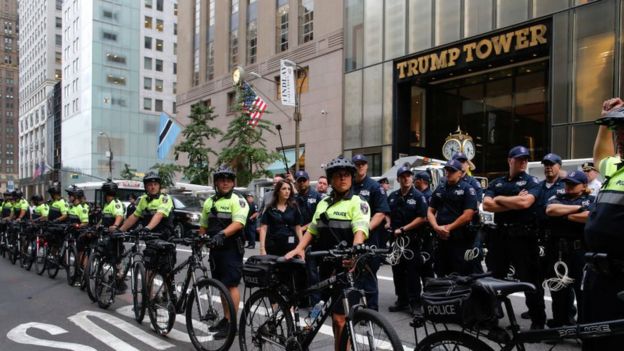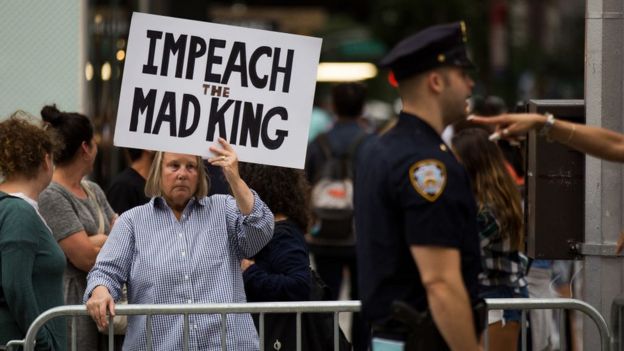USA Has Been Diminished at Home and Around The World
I've just returned to Washington after a few weeks in Europe. In 20 years of living in the US, I've never returned to a country so dispirited, nor so dismissed.
I include in that the anti-Americanism that surrounded the invasion of Iraq and the trauma of the financial crash.
Dispirited.
Back in 2004 and 2008 Americans were by and large united, or at the very least they were not so angrily divided. One might think that the sight of swastikas on American streets would indeed unite the country in unwavering purpose. Not so.
The country is so mired in political division that even Nazi symbols have become political symbols some can live with if they feel that condemning them would give succor to their opposition.
 GETTY IMAGES
GETTY IMAGES
And the man running the country is actively widening that divide.
There's little point parsing the rationale of President Trump's defence yesterday of the "fine people" who took part in the white supremacist march in Charlottesville. I doubt he himself was even trying to make a reasoned case.
I suspect that rant of a press conference was driven more by his sense of personal grievance - his anger at being attacked over his initial response to Charlottesville - than by his views on race. But Mr Trump's failure to unambiguously and repeatedly condemn those far-right, racist groups gives them oxygen and strikes a blow at the heart of American identity.
American prides itself on being centrist, on not having the European tendency of flirting with extremist groups. Respected veteran political commentators have often told me that the US always gravitates to the centre ground. It sure didn't look like that in Charlottesville - ask Germany, or Italy, or Spain.
 GETTY IMAGES
GETTY IMAGES GETTY IMAGES
GETTY IMAGES
And if America is going to become just another country, albeit with a lot more weapons, no wonder the world is revising its opinion.
Dismissive.
The degree to which Americans talk about themselves as a special, unique country has often struck me as a little grandiose. You don't hear the French, or Brits, or Australians talk about themselves that way - though they may well feel it.
But perhaps it takes the loss of that uniqueness to make us realise how real it was and how much the world relied on it. This summer I spent time in the UK, France and Spain. In all three countries, leaders are trying to figure out how to get by without American leadership on critical issues like climate change and trade, while the general publics increasingly see the US as a non entity. It's not even seen as a joke, people are saddened by America's diminished global status.
Europeans have long had a complicated and somewhat insecure relationship with the US, part admiration, part jealousy, part irritation. But this year the reaction in Europe to America felt different.
Continental Europe is feeling more confident, the economy is doing better and far right groups have been defeated at the ballot box. Even Britain's decision to withdraw from the EU doesn't get much attention - Brexit is old news in France and Germany.
That newfound confidence, mixed with America's clear dysfunction, does indeed create a sense of dismissiveness. For many Europeans, indeed many foreigners, Trump is a spectacle, a reality show on steroids. But that's about the sum of Europe's interest in America right now.
That newfound confidence, mixed with America's clear dysfunction, does indeed create a sense of dismissiveness. For many Europeans, indeed many foreigners, Trump is a spectacle, a reality show on steroids. But that's about the sum of Europe's interest in America right now.
Mr Trump's approval ratings are slipping fast. The overwhelming majority of Americans are appalled by all that the hideous scenes in Charlottesville represent.
Nothing is getting done in Congress. No wonder Americans are feeling disheartened. No wonder the world is figuring out how to get things done without their global superpower.
BBC

Comments